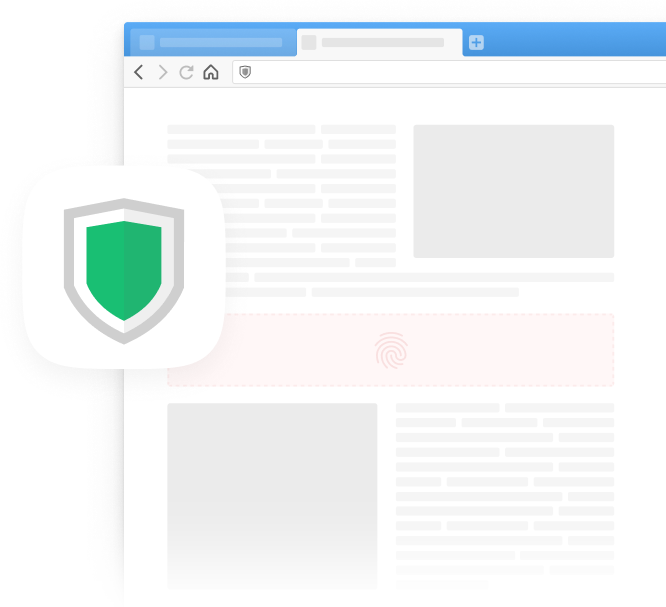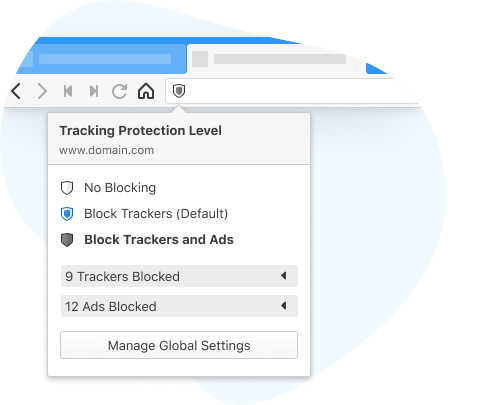
Ad Blocker – fast and free, no extensions needed
Vivaldi browser’s integrated Ad Blocker blocks intrusive ads, helps web pages load faster, and protects your devices from malicious ads and trackers. Download Vivaldi browser and surf fast and safe – without extensions.
Why use our adblocker?
- Browse faster.
- No extensions needed.
- Stay safe and secure online.
- It’s free. Forever.
Enable Ad Blocker and browse fast
- Without ad blocker, online advertisements not only interrupt your browsing, they stop webpages from loading fast.
- When your browser is busy downloading advertisements – banners, pop-ups, animations, autoplaying videos – your browsing slows down.
- With ad block on, you browse faster because webpages load much more quickly.
- Vivaldi’s pop up blocker stops advertisements as soon as you request a page. We rely on a list of URLs known to distribute ads and stop requests to those URLs before they are even sent. This way, you never download the ads. And you need less bandwidth, CPU, and memory because your browser with adblock isn’t processing more information – another reason you browse faster!
Built-in ad block is better than using extensions
Do you want ad block right in your browser? With our ad blocker you don’t need to install extensions to get rid of pesky ads.
If you are using a third-party pop up blocker, such as AdBlock or AdBlock Plus, you’ll no longer need that.
Although extensions are often helpful, they can create compatibility issues. Vivaldi browser is packed with features designed to work well with each other. Our philosophy is to rely less on third-parties.
And extensions are always an option if that’s what you would like.

CompareVivaldi browser’s integrated Ad blocker vs third-party extensions |
Vivaldi browser’s Ad blocker | Regular third-party extensions |
|---|---|---|
|
Ad blocking Most ad blockers today remove ads before they are loaded or displayed on a webpage. |
Yes | Yes |
|
Available out of the box Third-party extensions are not available out of the box and you’ll need to download them to your browser from an extensions store. |
Yes | No |
|
Secure browsing Extensions run in the browser and it’s therefore essential that you pick carefully what you install. |
Yes | No |
|
Solid performance Heavy reliance on extensions can compromise the performance of your browser. Often, they sap memory resources and slow you down. |
Yes | No |
|
Seamless user experience User experience is much better with native features. Native features will always provide a better, consistent with the product user experience. |
Yes | No |
Stay safe with integrated ad blocker
With ad blocker, you stay away from advertising trackers that can compromise your privacy.
Many online ads use the same technology as trackers. They follow you around the web collecting valuable information. They rely on snippets of code that can be exploited to gain access to sensitive information.
Prevent your device from showing malicious download ads.
Without adblocker, you will keep seeing online ads that distribute viruses and malware, compromising your data and computer. “Malvertising” prompts you to go to scam websites and download malicious files or click on links that turn out to be something else. Some websites are more likely to show malvertising ads than others, but websites that display advertising may not have full control over the advertisements they host.
Use ad block to avoid seeing ads for malicious extensions.
Third-party extensions run in the browser and can use their access to snoop on you. Keep your data and devices safe with our pop up blocker. It will block ads, including those for malicious extensions.

Ad blocker with built-in privacy
Some ad blocker apps monitor their users, create profiles of them, and sell their data to generate revenue and further their business.
Apps, including ad blocks, have different sources of income.
Vivaldi browser is different. We are in the business of protecting your data. We integrated an adblocker in Vivaldi to safeguard you from the worst kind of ads, the tracking ads.
We don’t track you.
We don’t profile you.
We don’t sell your data (we have none).
Before you make a choice, ask this: What is the ad blocker’s business model?
Enjoy ad block, for free
Vivaldi browser’s ad block is free to use all the way, no premium features or functionality behind a paywall.
Out of the box, Vivaldi has more built-in functionality and flexibility than any other browser – and it’s all free! Take advantage of our Ad blocker!
Stay mindful
The sites you visit on a daily basis will suffer once you turn ad block on – ads are a source of revenue for many websites.
As proponents of the free internet, we want websites to keep generating revenue.
In Vivaldi, you decide how you want sites to display and what you want sites to know about you.
We recommend blocking trackers on all sites, but ad block only on websites where advertisements are intrusive or distracting.
To support your favorite websites and free content on the Internet, we advise:
- Do not enable ad blockers across all websites.
- Allow advertising from websites you trust.
- Consider blocking just trackers with Tracker blocker. Tracker blocking will prevent the worst kind of ads – the tracking ads.
- Support websites you regularly visit by donating directly to them.
Learn more about ad blockers
-
What is ad blocker?
Ad blockers are software that filters out online ads. They make sure ads don’t show up on websites. The filtering usually happens in a browser – through built-in functionality, or via browser extensions such as AdBlock or AdBlock Plus. Most ad blockers and YouTube ad blockers remove ads before they are loaded or displayed on a website.
-
How ad block works
Most ad blockers rely on two techniques.
First, they intercept requests made from your browser and compare the requested URL to a list of domains and URLs that are known sources of ads. If the requested URL is on that list, the request is cancelled and the page never gets to load the ad.
Then, ad blockers look for elements on the page where ads are known to be shown and hide those. This blocks pop-ups that may not have been blocked in the first step, and also hides blank spaces left behind by ads.
-
Are all ads blocked with ad block?
Since ad blocking relies on lists of URLs known to point to ads, it’s not technically possible to block 100% of ads. The authors of those lists cannot possibly know of every ad source out there at any given time. In addition, the ad landscape of the Internet is constantly changing with new sources showing up and old ones disappearing.
-
Do ad blockers collect your data?
Each application approaches data collection differently. We advise that you check the Terms of use before downloading an ad blocker. Vivaldi browser’s Ad blocker does not track its users. In addition, we campaign against tracking and data collection.
-
How to enable ad block in Vivaldi browser?
In Vivaldi, the Ad blocker is off by default.
When you download and install the browser, we will ask you what level of blocking you would like to have. You can choose between “No blocking”, “Block trackers”, or “Block Trackers and Ads”. You can change this preference in settings at any time.
By default, Vivaldi browser’s Ad Blocker allows non-tracking ads to be shown on our partner search engines pages. You can choose to block those ads by disabling the “Allow ads from our partners” list in the ad blocker sources.
-
How to turn off ad blocker?
You can disable Ad blocker at any time. Go to Vivaldi Settings and select “No blocking”. You can change this preference at any time.
-
How does Vivaldi browser block ads?
We block ads by relying on a list of URLs known to distribute ads, and by stopping requests to those URLs before they are sent.
In its general design, our Ad blocker is similar to most content blockers. It features a content-blocking engine that determines what should be blocked.
-
Which block lists does Vivaldi browser use?
For blocking ads, we use the EasyList by default and we provide a variety of local ad blocking lists that can be optionally enabled. Some of those lists are affiliated with EasyList.
For blocking trackers, we use the DuckDuckGo Tracker Radar and optionally the well-known EasyPrivacy list.
You can view and manage ad block sources by navigating to the Settings. To enable a blocking source, tick the box in front of the listed source. If you want to stop using the blocking source, simply untick it.
If the blocking source you want to use isn’t already listed, you can import more sources.
-
How to block ads only on specific sites?
Once on the website, click on the shield button in Vivaldi browser and tweak the blocking level to “No blocking”, “Block trackers”, or “Block trackers and ads”.
-
How to check the number of blocked ads?
With Vivaldi browser’s ad blocker you can check the number of blocked advertisements by clicking on the shield button on the left of the Address field. Make sure you’ve enabled at least some level of blocking, then click on the shield button to see exactly how many have been blocked.
